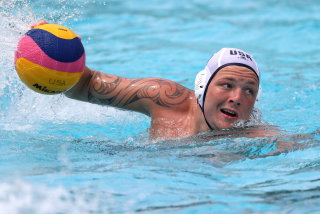Athletes From Estonia Hope to Make Most of Days in the Sun
- Share via
Having dealt with Soviet athletes on a number of occasions in the past, I was accustomed to finding them accompanied by mysterious characters with no discernable functions.
It would not be an over-simplification to say they looked to be guys out of Ludlum novels.
It did not require a doctorate in international relations to figure out which branch of the Soviet bureaucracy employed these chaps.
The athletes themselves, speaking through interpreters, were always tight-lipped and cautious. It was either that, or the interpreters were saying what they wanted to be said rather than what the athletes wanted to say.
Times have changed.
A group of six athletes from the Soviet Union was in town this week to train and participate in a track meet at UC San Diego Saturday.
Wait a minute. I need to make a correction here.
A group of six athletes from Estonia was in town this week. Estonia is, of course, a part of the USSR, but these are times when an Estonian can declare pride in being what he is rather than what was imposed upon him (or his ancestors) 50 years ago.
Indeed, these people were all in San Diego without permission. That may sound daring, but it isn’t. They don’t need permission any more.
What’s more, they can speak their mind.
For example, Marek Kaleta is a 28-year-old javelin thrower with a dream he no longer has to keep to himself.
Speaking through Anu Purken, an interpreter in a sun dress rather than a trench coat, Kaleta talked of going to Barcelona for the 1992 Olympics.
“It will depend on politics, because things are changing every day,” he said, “but it would be great to compete with our own team. I’d like to compete under our national flag . . . blue, black and white. This is my dream.”
Estonia has not competed under its own flag, but rather the Soviet flag, since the 1936 Olympics. It was swallowed by the Soviet Union in 1940, occupied by Germany from July, 1941, until September, 1944, and then absorbed once again by the Soviet Union.
“Little nations,” Purken said, “are like toys to the big countries.”
Obviously, she is hopeful Estonia doesn’t become a pawn for international gamesmanship in its quest for independence. For one thing, Estonia is going about it a little more diplomatically than Lithuania did.
“We are striving for independence,” she said, “but we’re trying to do it with negotiation with Moscow and our government. We don’t want to just declare our independence like Lithuania did. We’re too small a nation and, economically, we are so bound to the Soviet Union.”
Athletically, Estonia can stand on its own. The biggest sports, Purken said, are basketball, soccer, track and field and yachting. Estonians won medals in cycling, yachting, track and field, fencing, skiing and basketball in the 1988 Olympics.
But being able to stand on its own and being allowed to stand on its own are not necessarily one and the same. Estonia’s Olympic committee, while never disbanded, has been a bit inactive of late. It is currently negotiating with the International Olympic Committee as well as the Soviet Olympic committee.
“We hope very much the Soviet Union Olympic committee will approve our Olympic team,” Purken said.
Quite likely, all these moves for independence will be intertwined.
What the Estonians have now is enough freedom to give them a taste of what it might be like to be independent.
Could this group have come on its own to San Diego as recently as two years ago?
“No,” Purken said, “by no means. The great changes began in 1988. Since then, things are improving all the time. We have direct contact with other countries and other sports clubs and that would have been impossible before. We can now travel freely and talk freely, and that would have been unbelievable a couple of years ago.”
So here they were on the track at UCSD on a sunny Friday. They had been to the San Diego Zoo and they had been to the beach, and the Estonian winter was in another world . . . just as Estonia itself seems to be entering another era if not another world.
“We’re very impressed with San Diego,” Marek Kaleta said. “The conditions are so excellent here.”
In their own way, as visitors, these people were as refreshing to me as the San Diego weather was to them. If they are representative of the new spirit and attitude in Eastern Europe, I suspect maybe I won’t see another trench coat outside of a Pink Panther movie.
More to Read
Go beyond the scoreboard
Get the latest on L.A.'s teams in the daily Sports Report newsletter.
You may occasionally receive promotional content from the Los Angeles Times.






